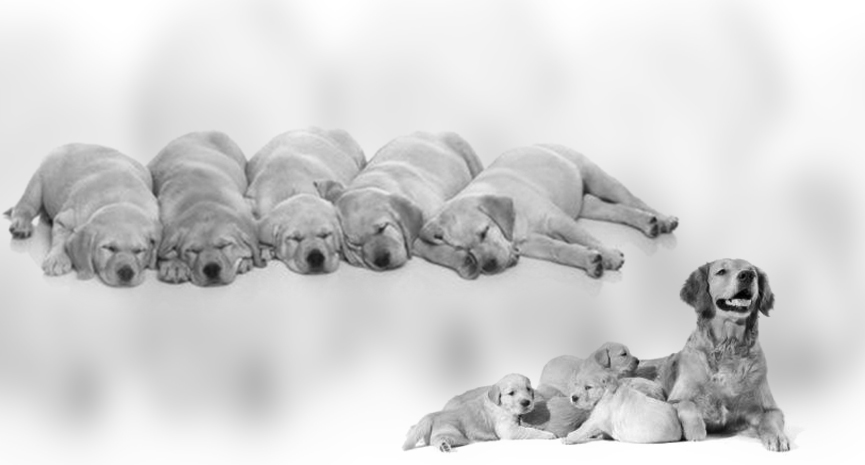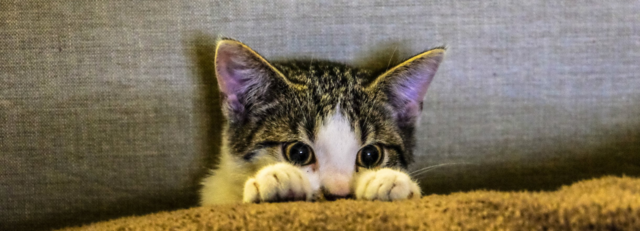Life was good. I had lots of brothers and sisters, and my mom was the greatest. Besides being the most beautiful dog in the world, she had the yummiest milk and lots of it. Sometimes I had to knock my bossy brother out of the way to get to my station, but it was heaven!
We all like to snuggle in a big, wiggling heap, and there’s nothing better than snoozing away nose to tail. When it comes to showing off our latest tricks, my brother, who has taken the unofficial reins as the leader of our little pack (after Mom of course) was amazed that I could walk 20 steps away from the “milk station”, and nothing bad would happen. In fact, I don’t think Mom even noticed when I was gone because every time I wandered away, she decided to take a quick snooze on the job.
It was after we were all able to walk around without (almost never) falling that these large, large… creatures appeared. They didn’t smell like dogs, and they made funny sounds. And they had these really long legs and some had paws with shiny nails that reached into our pen. They were pretty good when it came to belly rubs and little tickles behind the ears. They would scoop us up into their enormous paws, and snuggled us against their chests while all the while we pretended we weren’t terrified.
After a while, Mom began living on her own in a swanky condo in another part of the world. Bowls of crunchy stuff appeared to be eaten, and we drank bowls of clear, cold liquid that tickled my nose and got my face all wet. At first it was a special treat, but when I realized it was dinner, I was stunned, but then my brother hit me in the nose, and I forgot all about it!
Day by day, my brothers and sisters began disappearing. It seemed to happen when those giants came to rub our bellies, and each time another one of us vanished. We’d all huddled together tighter, we never knew who would be next.
And then, one day it was my turn.
As bipeds on long legs, it’s hard to imagine what a puppy or kitten is going through when we first bring them into our homes. Everyone is excited and caught up in the experience, but we may forget that the world is very different when you’re only inches from the ground with a brain that’s wired in a very different way. “A big problem with communicating with our pets is that a family often thinks they’re talking to a child,” says Robert Kornfeld, a retired police officer with over 16 years of experience as a police dog trainer who currently works mostly with families and their dogs. “I’m able to clarify that a dog is not a child, and I wind up seeing a much greater response from the dog.”
The more we understand our pets, the better companions we can be for them. But because puppies and kittens come to us from diverse environments, their initial experience in our homes is different. If coming from a rescue organization, pets may be older than a puppy coming from a breeder, or they may have been taken away from their mother too soon,each requires different training techniques. Breeders usually allow their puppies and kittens to go to a home at 10 to 12 weeks; reputable breeders will have already been working on socialization, which is the process of exposing your pet to the sights and sounds of the world they’ll inhabit so they can become confident and relaxed in any situation. But no matter where you get your pet from, by the time you pick-up and transport them to your home, you will have a stressed out animal.
“I don’t think it’s the same for every animal, but there’s certainly some separation distress when an animal is taken from other animals that they’ve already bonded with and that they’re comfortable with,” says Ellen Lindell, a certified animal behaviorist and veterinarian who sees patients at VCA Shoreline Veterinary Referral and Emergency Center in Shelton and at VCA Norwalk Veterinary Referral and Emergency Center in Norwalk. “But it’s their nature, with dogs particularly and with cats to some degree, to be very flexible with their social group. So it’s not typically very difficult for a pet to bond with somebody new and do it very quickly.”
Those first few days can be stressful for both new owners and their pets, but knowing what to expect and being prepared can help make the transition smooth and positive. “When an animal first arrives, it’s usually afraid. It doesn’t know what’s going on or what to expect, and who that family is will determine how quickly that animal learns to adjust,” says Certified Canine Behavior Counselor and trainer Sharon Mear. “For the first couple of days the puppy is usually on its best behavior. I think the trauma from the travel and the new environment keeps them quiet, but there is also the other extreme of the hysterical dog. I liken it to the foster kid. They come in, and in the beginning, they’re checking out the scents and the people, and they’re just really quiet, but as they become more comfortable, they begin to test you. And that’s where the jumping and the barking generally begins to happen.”
The giant scooped me up, and I didn’t even have time to say goodbye to Mom and the one sister who was still left. Before I knew what was happening, I was in the air and put in a big, soft bag. It was dark inside. Hey! I barked. Who turned the lights out? What’s going on? Where am I! I want my mommy!
But apparently, these big bipeds didn’t understand my bark. Maybe they were a little slow like my sister who was left behind because, I think, she didn’t understand that her tail was attached and even if she caught it, then what? And no matter how much I laughed at her, she didn’t catch on. And she was my sister. So what chance did I have with these strange giants? I was in deep well, you know.
So I decided that the best course of action was to be really quiet. Maybe they would forget about me, and I could escape and find my way back home. I hunkered down and pretended to sleep. And then I was inside a strange house. I was given a kiss on my head and put down on the floor, and a bunch of giants appeared, reaching out and oh my goodness, tickled me but I was so scared. As soon as I could get away, I ran in a panic, looking for a place to hide.
Most trainers advise that the puppy’s or kitten’s first week home should be a quiet one. After showing your pet where their bathroom is (hint, it is outside), let them sniff and explore their new accommodations and it may be better to let them master just one room at a time. Robert Kornfeld advises using a low, soft voice, beginning with the trip home (no kids fighting over who gets to hold the dog). People should avoid fast movement while the pet is exploring. But the most effective way to help your pet become comfortable with the world is through socialization.
“They need to be socialized to all sorts of things like people in different kinds of clothing, the car, buses and trains, traffic noises, and all different surroundings so they become at ease,” says Fairfield County’s Rick Weatherstone, the owner of Tactical Response LLC K-9 Training and Services and a Certified Patrol Dog Handler. “When something is new to an animal, they’re standoffish and they’re scared because they don’t understand it yet. By taking your new pet through the house and reassuring and praising them, they should begin to feel comfortable.”
Ellen Lindell suggests giving your pet a den-like place where they can hide if they need to and letting them come to you when they want to interact rather than chasing after them. Sharon Mear stresses that the family must work with a new pet in order to make sure they adjust. “It’s really about the family doing the diligence. You must keep a journal. It’s like baby’s first book, and you write down all your observations, because the more you observe and the more you understand your puppy, the easier it is for somebody to come in and help you. But if you’re not consistent, you are sending mixed signals, so it’s a whole family effort.”
I found a soft cave and decided to move in. For the first few days, I refused to come out. They brought that crunchy stuff close to the cave, and when they went away, I stuck my head out and stuffed my face. Guess it isn’t so bad after all.
And then they came back and carried me outside. I had a long cord attached to something around my neck, and I just didn’t like that at all, but when something called a squirrel ran by, I couldn’t help myself, I ran after it as fast as I could. When it finally ran up a tree, I skidded to a stop. Looking around, I had no idea where I was, and I was about to panic when I noticed, way back behind me, the giant was still attached to me by that cord. Whew! Maybe these giants were smarter than I thought they were.
Puppies and kittens can usually adjust very quickly, and very soon after you bring them home, their curiosity will replace their fear. That’s when they really begin exploring, and it’s when you have to watch them carefully to make sure they don’t get into something that can hurt them (do some research on puppy- and kitten-proofing your home). Working with your pet to introduce them to the world and teach them some manners should begin as soon as possible. “From an animal’s point of view, they actually learn things very quickly because animals learn through association and behavior does not happen in a vacuum,” says Sharon Mear. “They need the environment to learn. So a stimulating environment will certainly help the animal grow. When an animal first arrives, it’s terrified. It doesn’t know what’s going on or what to expect, and it is the family that determines how quickly that animal learns to adjust. They imprint on whoever it is that raises them, and the earlier the imprinting takes place, the better.”
After my heart stopped pounding, and it sunk in that I wasn’t hopelessly on my own, I followed the giant back home. And when the good-smelling giant picked me up, I got carried away, and I gave her a bunch of kisses. She seemed to like that a lot. When I ran through the front door and skipped around the room, I realized how happy I was to be back in there. And that’s when I understood that I was home, and while home was still a mystery, it was more exciting than scary. Then the giant gave me a piece of my newest heaven, which smelled incredible. (My tail is wagging just thinking about it!) I learned that it’s the best treat in the whole world–bacon–and only a giant could get it for you. So maybe this wasn’t going to be so bad after all. In fact, I could get used to this life.





